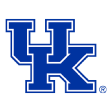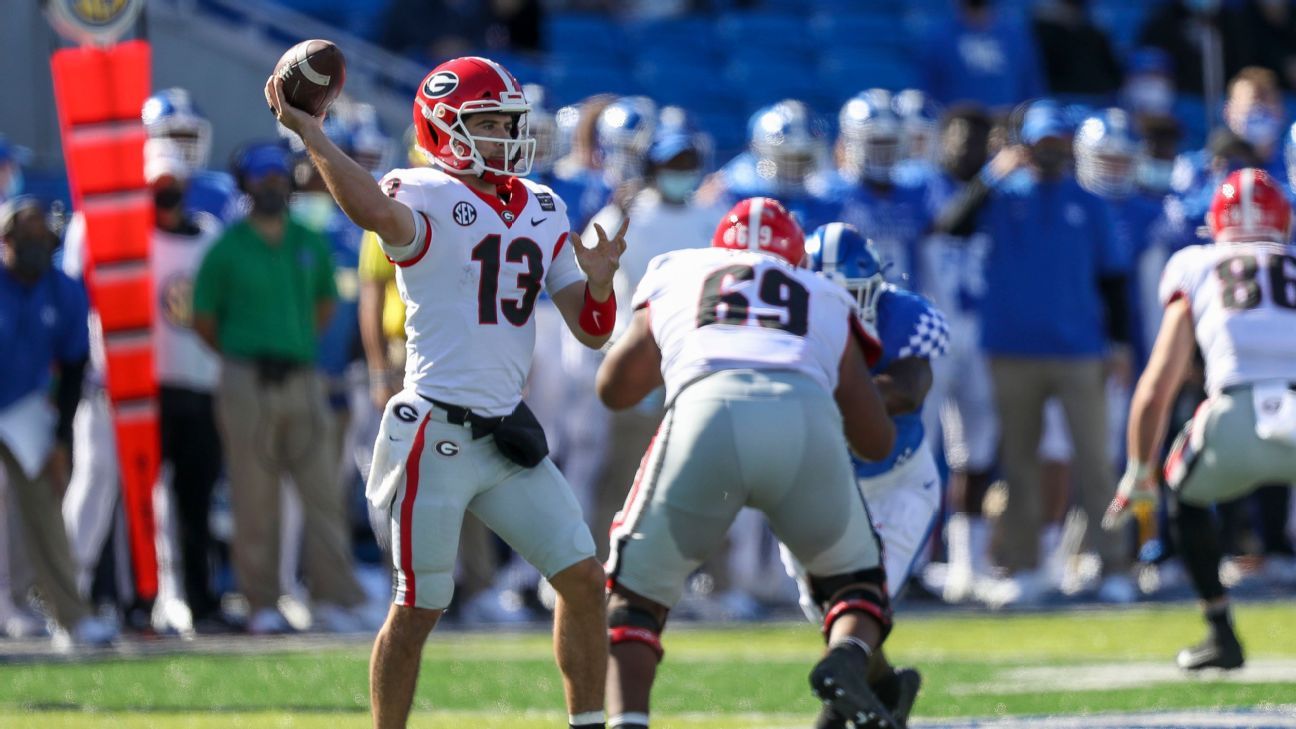Just when pundits had penciled in Alabama and Georgia as two unstoppable forces on a collision course for the SEC championship game and College Football Playoff, Texas A&M stepped into the breach and reminded the college football world that there is only one sure thing at the midpoint of 2021:
Unpredictability.
We have seen it in the sheer volume of upsets across the board and in a top 10 that looks vastly different than the one to start the season. Alabama, Clemson and Ohio State — all perennial playoff teams — already have at least one loss each, and we’re only six weeks in.
What Texas A&M did last weekend goes down as the most unpredictable result yet. Alabama had beaten the Aggies by an average of 23 points in three previous meetings under Jimbo Fisher. Texas A&M went into the game with a struggling backup quarterback and an injury list nearly 10 deep. Yet somehow the Aggies won.
When asked how everything came together for his team last week, Fisher told ESPN, “Sometimes it gets down to this: You got to. Someone asks, ‘How did you do something?’ I don’t know; I just had to. It’s amazing how you can put yourself in that situation. We have to this week too against Missouri. But now, it’s can you handle success?
“It’s great to be an underdog. But you don’t ever want to be an underdog. An underdog says you’re content being second, third and fourth place. We have to learn that these aren’t upsets. Only we can get upset. We have to change that culture and mentality, and now, that’s the part we have to educate our players on.”
Fisher said he saw glimpses from quarterback Zach Calzada despite the struggles in losses to Arkansas and Mississippi State, noting how sometimes players just need to grow up once they are put into game situations. But the unpredictability across the board has been something everyone has had to deal with — coaches included.
“You’ve got younger players, guys in the transfer portal, you got guys bouncing around, not as many guys familiar with situations or how teams work; that could possibly cause it. But whoever can figure this out and get it back to normal will be the guy who comes out on top,” Fisher said.
The chaos has reached other conferences too. The ACC is completely wide open now that Clemson has lost. The Big Ten also appears to be up for grabs, with the undefeated squads of Iowa, Michigan and Michigan State and one-loss Ohio State and Penn State still very much in the thick of the race. The same goes for the Pac-12, which is as unpredictable as ever. It all makes Stanford coach David Shaw take notice. He and his fellow Pac-12 coaches are used to this. And given the way people have grown tired of the same teams at the top of the sport, Shaw has welcomed the change.
“I’m pleased that there’s parity in college football, and I think it makes it more exciting,” Shaw said. “Because you don’t know, week to week, who’s going to win. There are no guaranteed victories, and every conference now is tight. Every week, there are upsets, and every week you know the top 25 gets flipped upside down. That makes it more fun for everybody involved.”
When asked whether he has an idea about the way the season will play out, Fisher laughed.
“I wish I did,” he said. “I’d sleep better.” — Andrea Adelson


No. 11 Kentucky at No. 1 Georgia (3:30 p.m. ET Saturday, CBS): Kentucky’s defense won’t be the one that gets most of the attention leading into the game at No. 1 Georgia, but make no mistake: It’s the reason the Wildcats are 6-0 for the first time since 1950, and it’s why the wins could keep coming.
A veteran unit led by end Josh Paschal, linebackers DeAndre Square and Jacquez Jones, and free safety Yusuf Corker has allowed only 17.5 points per game and 4.6 yards per play. Kentucky has bought a transitioning offense enough time to get right. Kentucky ranked last nationally in turnover margin for a while, and it still ranks third to last (minus-8), but the Wildcats continue to win because of an experienced and reliable defense.
“There’s just a calm,” Kentucky defensive coordinator Brad White told ESPN. “When they go out on the field, they don’t get nervous. It’s really cool to be around. There’s no panic. Man, they just play hard. It’s not always perfect, but it’s relentless.”
Paschal makes Kentucky go, and he could keep the Wildcats in Saturday’s contest if he can pressure Georgia’s quarterback, again expected to be Stetson Bennett. The 6-foot-3, 278-pound senior DE leads the team in both tackles for loss (7.5) and quarterback hurries (6). Paschal has 17 tackles for loss in his past 19 games.
“He’s just playing at a different level right now, and he has been for the last two years,” White said. “He’s so disruptive, he creates negative plays, he forces offenses to know where he is, which opens up things for other guys.”
Paschal’s performance will be especially significant against Georgia, as Kentucky will be without top interior linemen Octavious Oxendine and Marquan McCall, who are out with leg injuries. White will ask sophomores Justin Rogers and Josaih Hayes to handle the noseguard spot.
Kentucky is a 23-point underdog in Athens, but White expects his defense to step up.
“They understand the quality of the defense we’re about to play against,” he said. “A competitor always judges himself against someone else in his field, so if you want to be compared and feel like you are a defense that’s in the upper echelon of the country, you’ve got to compete at that level, and you’ve got a great measuring stick sitting right across the field.” — Adam Rittenberg


UCF at No. 3 Cincinnati (noon ET, ABC): During Tuesday’s media availability, Cincinnati coach Luke Fickell was asked if he felt like the No. 3 Bearcats were one of the best teams in the country. It’s a question that only gets asked of coaches and players who can reasonably answer “yes,” and a question that only elicits a surprising answer if the coach or player were to say “no.” So, Fickell replied with certainty that he believes Cincinnati is just that.
That kind of confidence from a Group of 5 team isn’t new. But in the past few years, it’s come from Cincinnati’s opponent this weekend: UCF. Fickell acknowledged that Tuesday, saying UCF has been the American Athletic Conference’s most talented and consistent team since he has been at Cincinnati. It’s why the Bearcats have looked at the matchups between the two teams as a rivalry — competing against the program they must beat in order to be the conference’s best.
The Knights, for their part, are having a down year. At 3-2 with losses to Louisville and Navy they’re nowhere near scratching the heights that previous UCF teams have reached. Still, Fickell isn’t letting the narrative turn this into a possible trap game for Cincinnati, which is favored by three touchdowns.
“They still have a lot of skill,” Fickell said. “They still have that talent and big-play capability, and they’re better defensively than they have been.”
Bearcats quarterback Desmond Ridder reiterated his coach’s sentiments on Tuesday.
“Coach Fick does a great job of saying, ‘It’s not going to be the best ranked team who wins. It’s going to be the best team that plays together Saturday,'” Ridder said.
This season, the plight of the Group of 5 teams in the playoff chase is Cincinnati’s to shoulder, and they’ve done their job so far. Against Temple last week, the Bearcats finally “played four quarters,” according to Fickell, and blew out the Owls 52-3. Given the rest of the Bearcats’ schedule (aside from possibly facing an undefeated SMU team in late November), their win over then-No. 9 Notre Dame will be the crown jewel by the end of the season. The question is whether it will remain as lustrous. But if Cincinnati can’t control that, it suits them to look inward for things that could veer them off course.
“I think for us as a team and as a program, it’s really about how we’re going to handle this attention and the things that are going on,” Fickell said. “We’ve been good about handling the buzz.”
It’s hard to argue with Fickell’s assessment that the Bearcats are one of the best teams in the country. And yet Cincinnati’s entire case for the playoffs feels as fragile as a chandelier: One stumble and the entire project will shatter to pieces. Of course, the ultimate dilemma of being in the Bearcats’ position is that even if they win out, they might not be guaranteed a spot in the playoffs at all. — Paolo Uggetti


No. 10 Michigan State at Indiana (noon ET, FS1): Michigan State’s incredible turnaround from 2020 to 2021 can be tied to a revamped roster and the ability to make many more explosive plays on offense. From 2016 to 2020, the Spartans averaged 5.09 yards per play, which ranked 121st nationally during the span. This fall, MSU ranks fourth in average yards per play (7.45) and is tied for 14th in plays of 20 yards or longer (36).
Running back Kenneth Walker III, a Wake Forest transfer who leads the nation in rushing (913 yards), has been the biggest factor, but so have the men making gains in the passing game.
“Ken’s a very talented player, but you’ve got to give kudos to the wide receiver group as far as their blocking,” MSU offensive coordinator Jay Johnson told ESPN. “They’ve done a great job in the blocking piece downfield. It’s helped some of those runs that might be average runs be more. That has paid dividends for them in the pass game.”
Johnson said top wideouts Jayden Reed (21.4 yards per catch), Jalen Nailor (21.1 ypc) and Tre Mosley (15.5 ypc) all excel in blocking. MSU also rotates up to nine offensive linemen, which has kept the group fresh. Johnson noted that veterans such as center Matt Allen and left tackle Luke Campbell, who missed most of all of 2020 with injury, have helped solidify the front.
They’ve protected quarterback Payton Thorne, a first-year starter who won a close competition with Temple transfer Anthony Russo before the season. Thorne has completed 62.4% of his passes for 1,575 yards and 14 touchdowns with only two interceptions.
“I’ve always liked Payton, but we did have a great battle in fall camp, and you just never know, since he hadn’t played much, how he’ll respond in the games,” Johnson said. “We’ve tried to simplify things overall with what we do, and even in the quarterback room, ‘Get your eyes in the right spot and get your feet right.’ He’s really just tried to go back to those basics.”
Thorne and the Spartans face an Indiana team that sits at 2-3 but boasts an experienced defense that has held three opponents to less than 200 pass yards.
“They’re very disciplined in what they do, and they’re where they’re supposed to be,” Johnson said. “It’s a good challenge for us. We’re going to have to earn it.” — Rittenberg


No. 12 Oklahoma State at No. 25 Texas (noon ET, FOX): Can Texas rebound from a heartbreaker?
After a crushing 55-48 loss to Oklahoma, the Longhorns will have to pick themselves up quickly with Mike Gundy and Oklahoma State coming to town.
“Nobody feels sorry for us,” Texas coach Steve Sarkisian said on Monday. “We don’t have a lot of time to feel sorry for ourselves.”
A home game doesn’t offer a lot of room for comfort, either. The Cowboys had won five straight in Austin until the two teams’ most recent meeting, a 36-30 Longhorns win in 2019. Texas held Oklahoma State off last year in Stillwater, 41-34. It’s been that type of close-fought matchup over the past four years, with the series tied 2-2 and just seven total points separating the two teams (122-115 in Texas’ favor).
Texas’ offense showed the big-play threat against Oklahoma that Sarkisian had been predicting would come as timing developed. The Cowboys, meanwhile, have had one of the country’s best defenses, allowing just 18.6 points per game.
Texas’ Casey Thompson threw for 388 yards and five touchdowns against Oklahoma. and the breakout of wide receiver Xavier Worthy (nine catches, 261 yards, two TDs) won’t allow the Cowboys to focus on star running back Bijan Robinson, who has rushed for 789 yards and scored 10 total TDs in six games.
Gundy, whose team ranks 89th in scoring offense, is counting on his defense against the Longhorns.
“I’d prefer not to get in a shootout with them,” he said this week. — Dave Wilson


No. 20 Florida at LSU (noon ET, ESPN/ESPN App): Florida’s defense, after getting hit in the mouth in the first quarter against Alabama on Sept. 18 in a 31-29 loss, has steadied the ship entering Saturday’s game at LSU. The Gators lost the rivalry game a year ago after defender Marco Wilson was penalized for throwing an LSU’s player shoe, setting up the Tigers’ winning field goal.
That shoe game sort of defined Florida’s disappointing season on defense a year ago, but the Gators have made a strong comeback on that side of the ball through the first half of this campaign. In the past 15 quarters, dating back to the second quarter of the Alabama contest, Florida’s defense has given up a total of 38 points (2.5 points per quarter). And in the past 10 quarters, going back to halftime of the 38-14 win over Tennessee, the Gators’ defense has allowed just two touchdowns; only one of those scores was a drive of 30 yards or more.
“We might have gotten a little nervous that first quarter against Alabama, didn’t handle the environment well, and they got some quick touchdowns. But after that, we settled down, and it’s a credit to our guys how hard they’ve played, the way they’ve bought in and developed,” Florida defensive coordinator Todd Grantham told ESPN.
The addition of defensive line transfers Daquan Newkirk, Tyrone Truesdell and Antonio Valentino has been huge for Florida, and Grantham said 6-foot-6, 303-pound sophomore Gervon Dexter has really come on since the Alabama game.
“He’s a powerful dude and has grown up and really been a factor for us inside,” Grantham said of Dexter.
Grantham explained that having to play so many true freshmen and young players last year (safety Rashad Torrence II and Dexter, for example) is paying dividends this season.
“They didn’t get a spring practice last year and have now had a full year to develop, and you can see the difference,” the D-coordinator said.
Some of the best news for the Gators is that All-SEC cornerback Kaiir Elam will return against LSU after missing the past three games with a knee sprain.
LSU will be without star wide receiver Kayshon Boutte, who is out for the remainder of the season with a lower leg injury. That’s a major loss for the Tigers’ offense, as Boutte had caught nine of the 17 touchdown passes.
But even before the loss of Boutte, especially going back to the 42-21 loss to Kentucky last week, the feeling around the league was that LSU was reverting to more of the running game used under former offensive coordinator and current analyst Steve Ensminger. Junior running back Tyrion Davis-Price had a season-high 22 carries and rushed for 147 yards against a Kentucky defense ranked 28th nationally against the run. No LSU running back had more than five rushing attempts in the 24-19 loss to Auburn the week before, and Davis-Price’s 13 carries were the most for any LSU running back in each of the Mississippi State and UCLA games earlier in the season.
“You can see [Ensminger’s] influence and that they were more committed to the run in the last game, and that’s something we’ve got to be ready for,” said Grantham, whose defense held Kentucky to 137 rushing yards and Alabama to 91 yards on the ground. — Chris Low


Pittsburgh at Virginia Tech (3:30 p.m. ET, ESPN2/ESPN App): For years, Pat Narduzzi has told anyone who would listen that he had an NFL-caliber QB at Pitt, but Kenny Pickett‘s annual stat line — 13 TDs and nine interceptions over each of the past two seasons — has meant that not too many folks were listening.
Indeed, NFL scouts pegged Pickett as a fourth- or fifth-round selection during last year’s evaluation process. Both Pickett and Narduzzi thought the ceiling was far higher.
“I just knew I was a better player than that,” Pickett said.
So, Pickett came back for a fifth season — he has been Pitt’s starter since late in 2017 — and he has issued an emphatic wake-up call to the skeptics thus far.
Through five games, Pickett leads all Power 5 QBs in passer rating (234.28) and is second to Alabama’s Bryce Young in passing TDs (19), and his completion rate (72.0%) ranks sixth nationally. It’s been enough to put Pickett squarely in the middle of the Heisman Trophy conversation.
And while the rest of the college football world might be surprised by that, Pickett isn’t.
“That was the plan when I came back,” Pickett said. “Heisman wasn’t the reason, but I came back to have a great season and to win a championship, and a lot of individual goals are met when you have a championship-level team.”
Pickett gets his biggest test of the season on Saturday when Pitt travels to Virginia Tech, where the Hokies have held opposing QBs to just 59% completions and seven passing TDs. Justin Hamilton’s defense has already frustrated North Carolina’s Sam Howell and forced Notre Dame’s Tyler Buchner to the bench after throwing two picks just last week. Virginia Tech’s secondary is led by nickelback Chamarri Conner and cornerback Jermaine Waller, who’ve combined for five interceptions and two forced fumbles so far.
“It’s a veteran group that makes plays, and they’ve got speed at every level,” Pickett said of the Hokies’ defense. “This will be our toughest test. They have a little of everything. That’s what makes them good. They show a lot of different looks. We’ve got to make sure our communication is on point and we execute the best we can.”
Pickett has thrown for at least four touchdowns in each of his past three games. (The 15 total TDs in that span broke a school record held by Dan Marino.) The last ACC signal-caller to do that was Russell Wilson in 2009.
Pickett also has thrown for at least 380 yards in his past three consecutive tilts. If he were to hit those marks again versus Virginia Tech, he would become just the third FBS QB to do so in four straight games in the playoff era, joining Cal’s Davis Webb and Washington State’s Connor Halliday.
Pickett also would likely put Pitt in the driver’s seat to win the chaotic Coastal Division. The Hokies and Panthers are the lone remaining Coastal teams undefeated in ACC play. — David Hale


Clemson @ Syracuse (Friday, 7 p.m. ET, ESPN/ESPN App): To say points have been hard to come by for Clemson would be putting it mildly. Through four games against FBS competition, the Tigers are averaging just 12.5 points per game in regulation, worse than every team in the country except Colorado, Rice and Southern Miss. Coach Dabo Swinney has chalked up the struggles to a lot of small things, including QB footwork, sustaining blocks and crisper routes. But it’s also worth noting that Clemson has one big problem: big plays.
In its four games versus FBS opponents, the Tigers are averaging an explosive play on just 8.6% of their offensive snaps, fifth worst in the country. Why’s that matter? Chunk plays make all the difference when it comes to scoring. Drives that have at least one explosive play (a 12-yard run or a 16-yard completion) result in points 64% of the time. Drives that don’t, less than 10%. Sustaining drives with short gains down the field is simply not a recipe for success — for Clemson or anyone else.
That’s something Syracuse’s defense is well aware of too. Only six defenses nationally have allowed a lower rate of explosive plays than the Orange (7.8%).
“We emphasize that a lot in practice,” said Syracuse defensive lineman Josh Black. “If a team is going to beat us by getting four or five yards every play, so what. But we can’t give up those giant plays. That hurts us; it hurts our offense. It puts everybody in a bad position.”
It’s been something of a trade-off for the Syracuse defense, however. Last year, the Orange were far more susceptible to big plays, but the Orange also got a lot of takeaways. It was an aggressive approach that led to a lot of boom-or-bust outcomes. This year, Black said Syracuse is still looking for more turnover opportunities, but that tally has been sacrificed a bit in favor of eliminating easy gains for the opposition.
It’s been a sound strategy for Syracuse, which is led by a veteran defensive line and supported by a back eight made up entirely of freshmen and sophomores. Making the opponent work for yards takes some pressure off the young secondary for Syracuse while also putting the pressure on opponents to avoid mistakes.
And for Clemson, plenty has gone wrong so far. Offensive coordinator Tony Elliott said the team’s focus is on “taking what they give us” and “making the layups” — which seems to jibe with Syracuse’s philosophy, as well.
“If we make them go the whole field, it’s not going to go well for them,” said Orange linebacker Mikel Jones. “Eventually, something’s going to go wrong for them.” — Hale


TCU at No. 4 Oklahoma (7:30 p.m., ABC)
Freshman quarterback Caleb Williams replaced Spencer Rattler against Texas and put on a show. Williams completed 16 of 25 passes for 212 yards and two touchdowns, along with 88 yards on the ground and one rushing touchdown.
The future battle between Rattler and Williams hasn’t been publicly settled yet, as Sooners coach Lincoln Riley won’t name a starter for Saturday’s game against visiting TCU.
It’s safe to say Williams earned more playing time, though, as he helped the Sooners beat the Longhorns 55-48 in a shootout. So, where did Williams come from and how did he get himself to this point where he’s pushing Rattler, who was thought to be a Heisman candidate at the beginning of the season.
Part of it has to do with Rattler’s play, as he has thrown 10 touchdowns and five interceptions through six games so far this season. But part of it is the fact that Williams is talented enough to push one of the top quarterbacks in the country.
Williams was the No. 1 dual-threat quarterback and the 16th-ranked recruit overall in the Class of 2021 out of Washington, D.C. He had a top list of Oklahoma, LSU, Maryland, Penn State and Clemson.
Williams won Gatorade Player of the Year for Washington, D.C., his sophomore year after throwing for 2,624 yards and 26 touchdowns while also running for 394 yards and 10 touchdowns on 102 carries.
When Williams committed to Oklahoma, he said he knew Rattler was the guy but that he wasn’t scared of the competition and wanted to compete as soon as he could. Williams is getting that opportunity now, and if he continues to play the way he did against Texas, he is going to make it difficult for Riley to keep him off the field. — Tom VanHaaren


No. 18 Arizona State at Utah (10 p.m. ET ESPN/ESPN App): The last of the unbeaten.
Coming into the season, the Sun Devils-Utes game figured to carry elevated stakes in the Pac-12 South race. But with it being so early on the schedule, it would have been hard to predict just how important this one has turned out to be.
ASU (3-0) and Utah (2-0) are the only remaining undefeated teams in Pac-12 conference play, and whoever wins will be the undisputed favorite in the division. This is especially true for ASU, which has already beaten UCLA and would then have the head-to-head advantage over both the one-loss Bruins and the Utes. The other three teams in the division — USC, Colorado and Arizona — all have at least two conference losses. ASU, which kicks off at 7 p.m. or later local time for the seventh time this year, has the conference’s best scoring (16.2 points per game) and total defense (298.0 yards per game), thanks largely to an experienced secondary that has combined for 147 career starts. That total ranks second among FBS schools. The Sun Devils are averaging 7.1 yards per play, which ranks No. 11 in the FBS, behind quarterback Jayden Daniels.
Following the death of cornerback Aaron Lowe, it has been a trying couple of weeks for the Utes. After beating USC on Saturday, the team flew from Utah to Texas for Lowe’s service on Monday, only to immediately turn around and fly back to continue preparations for the game against ASU. Their 42-26 win against USC was easily the team’s best performance of the season, and it will try to build off that in front of their home crowd. — Kyle Bonagura
